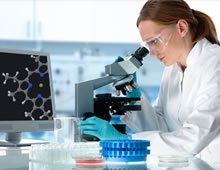Could Probiotics One Day Be The Answer To Autism?
 Some interesting research just surfaced concerning autism and probiotics…
Some interesting research just surfaced concerning autism and probiotics…
Scientists continue to discover more about the human body every day, isolating specific strains of bacteria and beginning to figure out their (often beneficial) functions in the body.
Though probiotics are most often associated with gut bacteria and digestive health, promising research shows that therapeutic probiotic treatment may provide a cure for Autism as well one day.
Not only is bacterial activity in the gut associated with skin health, it’s also been connected to healthy brain function.
We’ve all been told “you are what you eat,” but the deeper truth of this may be connected to much smaller microbes, invisible to the human eye.
The truth is, we as humans are made up largely of bacteria.
Massive, varied colonies of bacteria dwell deep within our digestive system, and can be found throughout the body, both inside and out.
Though fetuses are sterile while inside the womb, beginning at the moment of birth we become inoculated with various strains of bacteria.
Microbes are directly transferred from our mothers’ bodies, and continue to be transmitted from mother to infant through breast milk and skin contact.
As we grow, distinct colonies of bacteria form orally, in the gut and on the surface of our skin, in what is known as the human microbiome.
Human microbiome research is an impressively active field of study today, with far-reaching implications for human health.
It’s also particularly interesting since scientists have yet to discover one model of a healthy microbiome.
Which means each one of us is home to a bacterial colony as unique as a fingerprint or a snowflake!
For individuals with Autism, the gut-brain connection appears to researchers to be of particular significance.
The cause of Autism has not yet been found, and increasing numbers of children are diagnosed with the disease with each passing day.
According to Peter Patterson, professor of biology at the California Institute of Technology, mouse models have shown a causal relationship between gastrointestinal problems and behavioral symptoms.
Researchers have found not only that the gut bacteria of children with Autism fit certain patterns, but that gut bacteria may actually contribute to the disease.
What is often referred to as “leaky gut,” a potentially harmful condition in which bacteria in the gut leak into the bloodstream, is often associated with Autism and various other diseases.
A study described in the journal Cell in 2013 found probiotic therapy alleviated Autism-like behaviors in mice.
Mice treated with B. fragilis bacteria no longer exhibited signs of leaky gut syndrome, and showed improved gut health as well as improvement of some behaviors including obsessive behavior and anxiety.
Clinical trials have not yet been performed, so the potential results of similar treatment in human test subjects has not yet been determined.
Essentially, experts believe probiotic treatment may be able to have a life-changing effect on behavior in patients with Autism.
But unfortunately, figuring out exactly which bacteria result in the intended effects may prove to be a long process.
The behavioral problems associated with Autism are paired with gastrointestinal problems in ninety percent of Autism cases.
Potential improvement in both areas is the hoped-for outcome of probiotic therapy.
In this same vein of thinking, probiotic treatments may not be effective in individuals with Autism who do not experience associated gastrointestinal problems.
And as has been stated, it may be very difficult to determine exactly which probiotics to administer.
More Research Needed…
The idea that the live bacterial cultures consumed in one’s daily cup of fruit-on-the-bottom yogurt may help to improve behavioral and digestive problems associated with Autism may seem overly simplistic, or difficult to believe.
But sometimes it is the simplest solutions that serve the greatest need, and that may prove to have the greatest impact.
So for now, more research is needed to see if there’s any connection between autism and probiotics.
It’s exciting seeing another potential benefit of regular probiotic use!








